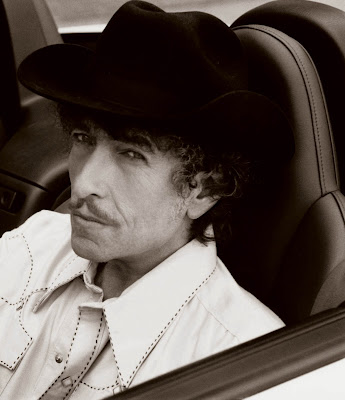 To wish His Bobness a happy 70th birthday seems more or less like holding up a lighter in a crowd of thousands. To get rid of the old shibboleth about his singing voice, if you don’t like it then just think of his records as rough demos sent in by a songwriter – for you to grab and interpret.
To wish His Bobness a happy 70th birthday seems more or less like holding up a lighter in a crowd of thousands. To get rid of the old shibboleth about his singing voice, if you don’t like it then just think of his records as rough demos sent in by a songwriter – for you to grab and interpret.His back catalogue of about 450 songs must include something you like, even if you didn’t know he wrote it! Watch Ab Fab, and that ‘Wheels On Fire’ song (The Julie Driscoll version), for instance, or Jimi Hendrix pouncing on ‘All Along The Watchtower’.

At one time or another he plundered, enhanced, transformed and re-created most genres of American music – both the cool and the (at the time) uncool. From Rock to Blues, Country to Folk and Gospel (even Punk) he inspired just about everyone to re-investigate their roots, and then bring them into the NOW.
He encouraged The Beatles to give up pop music and cover versions and write their own stuff; his example must have helped The Stones get away from reproducing ‘old Blues Men’ and write modern blues; he made Johnny Cash cool; even his Christian ‘phase’ gave the gospel crew some great songs.
He broke the three minute song taboo; he created maybe the first video to go with a song.
In most tribute shows people still forage through the ‘folk era’ (with those great, timeless, mythical and archetypal images) and the social conscience songs of the ‘protest’ period. They miss the jokes. It’s hard to do jokes.
A notable exception (for me) was K T Tunstall, closing an otherwise rather mournful 'tribute show' with fresh, life-enhancing versions of the first two songs on Blood on the Tracks. (I'd have happily listened to her recreate the whole album!

Very few people seem to tackle his output of the last twenty years, even if he continues to write prolifically, and occasionally astound us with something unique that doesn’t belong to any of the previous music categories. Perhaps these songs are so personal that they work best through his unique delivery, his actor’s expressiveness, breath control and sense for story-telling – the words on the page often don’t capture his particular use of the voice and images.
Instead of vacuous love songs, cheating songs and breaking up songs, Dylan gave us a whole adult range of love and hurt and regret, bitterness, sadness, reconciliation, acceptance, and forgiveness. He expanded the vocabulary of song-writing.
But hey, if you still don’t like the voice (and he’s actually been through several styles) listen to some of the hundreds of cover versions, and you will find not just amazing words but great tunes. He can do stadium singalong anthems, or simple, cheerful versions, even of the same song – for instance, the two versions of Forever Young on ‘Planet Waves'. He famously doesn’t like sounding like the album, or even like last night’s live version, or doing too many takes in a studio. He remains a spontaneous performer, who likes surrounding himself with great musicians, and playing live.

His recent outing as a DJ on XM Radio, that the BBC bought for the UK (even if he was assisted by researchers) demonstrated the range of music he loves, appreciates and understands – as well as displaying his rueful and deadpan sense of humour (that so many people miss).
Happy birthday, Bob!
